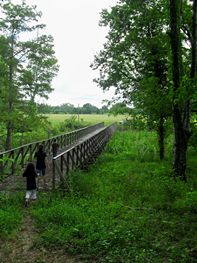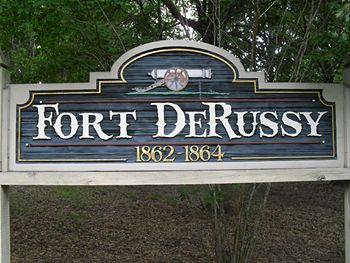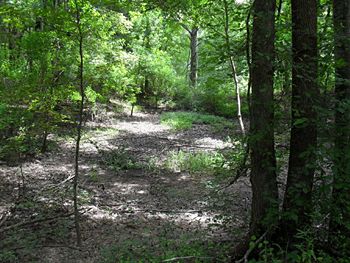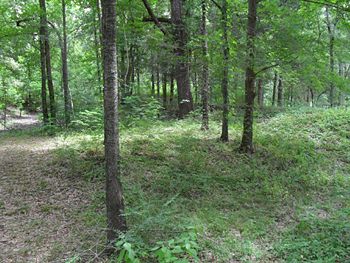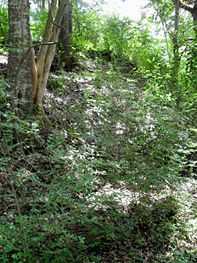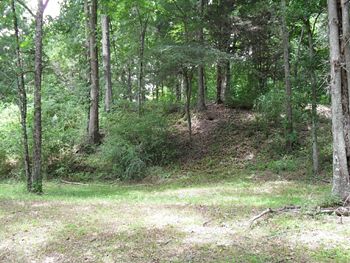|
(July 18,
2010) Enlarge Bridge for
tourists to enter or exit Fort.
This bridge was
built by convict labor to enable tourists to gain easier access to
Fort DeRussy. The field in the background extends to the current
channel of the Red River.
Photo by
William Bozic |
|
|
(July 18,
2010) This large and colorful sign is located at the fort.
Despite various mishaps to the fort over the years, the fort is in great
condition and well worth a visit. |
|
(July 18,
2010) Enlarge Powder
Magazine at Fort DeRussy
According to author Steve Mayeux, the powder magazine blew-up and later
filled with water to become a pond. (See large depression in the photo).
The size of the pond was expanded for use by cattle and the dirt
deposited inside the fort. |
|
(July 18,
2010) Enlarge Powder
Magazine and Fill Dirt
The site of the powder magazine is in the upper left of the scan while
the dirt taken from the site to enlarge the pond for cattle after the
war can be seen in the foreground of the photo. Also notice the trees
which were not in place during the 1862-1865 military period.
The aptly named book Earthen Walls, Iron Men: Fort DeRussy, Louisiana,
and the Defense of the Red River by Steve Mayeux, (University of
Tennessee Press: Knoxville) 2007, is a great source for those who would
want to know more about this historic site during the war and
afterwards. Having the author present to give a tour was a special
blessing which provided even more insight. |
|
(July 18,
2010) Enlarge This photo was
taken in the dry moat of Fort DeRussy looking up at the earthen wall
the Union troops climbed in their assault on the fort. Even after
close to 150 years the walls are still steep. Of course trees and
other vegetation have grown on the earthen walls and time has taken
its toll, but still the walls are amazingly high and steep so it is
possible to gain an impression of how difficult it must have been to
scale the walls, let alone being under fire!
The thought of these high walls being made by men with shovels
rather than modern earth-moving equipment makes the visitor even
more impressed at the effort and size of the earthen fort.
|
|
|
(July 18,
2010) Enlarge View from
state road nearby. Although it might seem contradictory since the fort
magazine site has been used for a cattle pond, the wall once had a road
through it, a modern home located near this photo has been removed, and
plenty of trees have grown, the real truth is the fort has been
pretty-much left in pristine condition.
The ramparts are high and a visitor gets a great idea of how things
were. The location is rural so it is a place were there is silence and
the modern world is far from marring the ambience.
Luckily the fort was made of tightly-packed earth so it remains. A
wooden fort would have rotted and a brick fort would have become a
quarry for other projects.
The State of Louisiana owns the site but there is not even a museum nor
any interpretive signs. This place is a gem for those with an interest
in the War Between The States!
|
